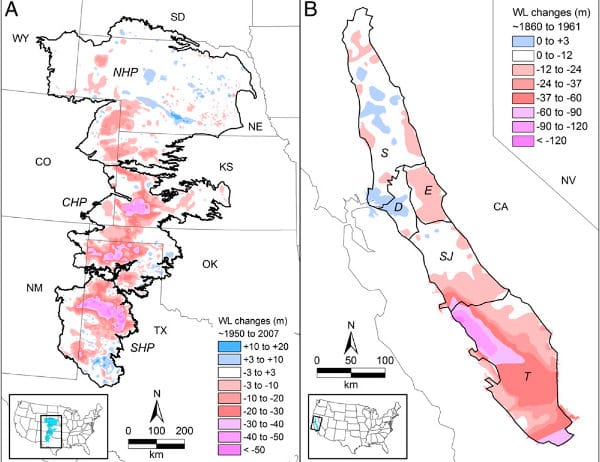Groundwater Depletion: The End of Agriculture As We Know It?


A disturbing report from the University of Texas says groundwater depletion in Texas, California, and elsewhere is so pronounced it now threatens our food security. These areas include some of our most fertile agricultural areas: the Central Valley in California and the High Plains stretching from northeast Texas to Wyoming and South Dakota. Together, these areas produce much of our vegetables, fruits, and grains.
Groundwater levels have dropped precipitously in these areas due to decades of pumping groundwater and using it for irrigation. The aquifers simply cannot recharge as fast as water is being pumped out. All of this is made worse by continuing droughts in Texas, the West, and California.
"We're seeing decreases in rural populations in the High Plains. Increasing urbanization is replacing farms in the Central Valley. And during droughts some farmers are forced to fallow their land. These trends will only accelerate as water scarcity issues become more severe," says Bridget Scanlon, lead author of the study.
The southern High Plains will be the worst affected. Scanlon says “irrigated agriculture in much of the southern High Plains is unsustainable.” Farmers will eventually be forced to switch to non-irrigated crops, which are less profitable, or to rangeland. Partial solutions include switching to sprinkle and drip systems from flood irrigation and storing excess water in good years in natural aquifers. While these methods may help, they won’t be enough to forestall inevitable changes in agriculture. We’ve used too much underground water for too long and now must adapt to the consequences of our shortsightedness. This shouldn’t be a political problem, but because both parties are so focused on attacking the other, major problems like water supply are being ignored.
Given our current highly polarized political climate, we could also spread plenty of blame to the other side. Republicans will howl that groundwater depletion is due to the dangerous socialist tendencies of Democrats then call for lower taxes as the only rational solution. Democrats will proclaim that skinflint Republican fiscal policies have endangered our food supply then announce a $500 billion plan overseen by the government to drill for water in areas where it is scarce. This squabble could go on for years without any solution being reached.
A better way, and one pointed to by the increasing numbers of independent voters, is to stop the pointless fighting and work together towards solutions. We can’t end droughts or replenish low groundwater levels the way it is now, but by working together we can plan for the future and determine how to handle these challenges. First the political polarization needs to end. Our food supply depends upon it.


